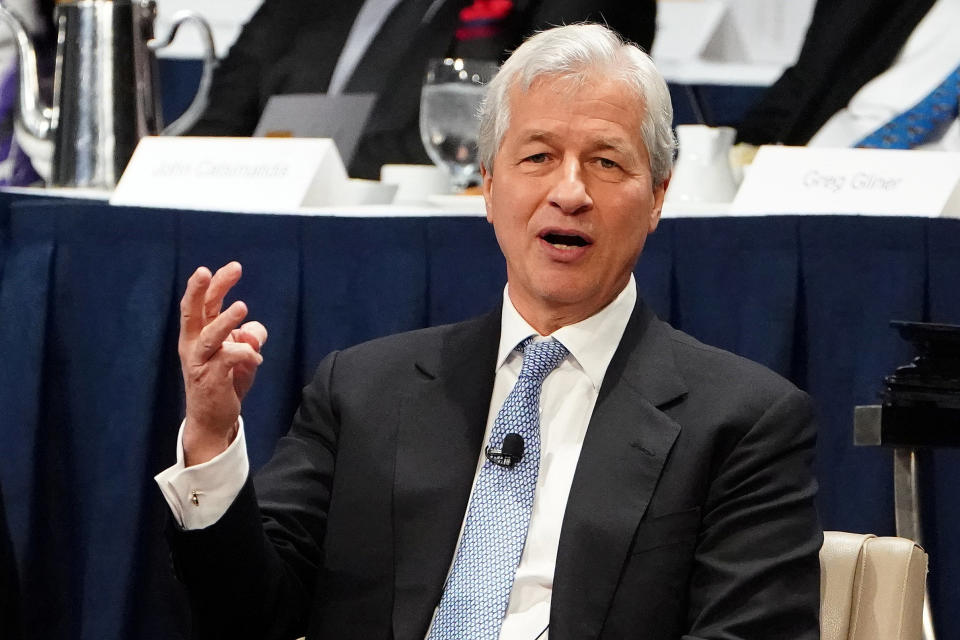Dimon: JPMorgan Chase 'prepared for' but not predicting a recession
JPMorgan Chase’s Jamie Dimon isn’t calling for a recession, but said the largest bank in the United States would be well-equipped to weather one.
In his annual letter released Thursday, Dimon said his company is “always prepared” to deal with the next recession and pointed to the company’s risk-hedging strategy and improved capital position.
Dimon also riffed on capitalism, stock buybacks, mortgage reform, and cybersecurity.
Although Dimon said the U.S. economy looks “fairly healthy,” he pointed to “legitimate concerns” over a global slowdown and flagged debt levels in the shadow banking sector.
“It’s hard to look at all the issues facing the world and not think that the range of possible outcomes is broader and that the odds of bad outcomes might be increasing,” Dimon wrote.
Global Economic Outlook
Dimon painted a relatively positive picture of the U.S. economy but expressed concern over conditions abroad.
The banker said the U.S. economy will continue to grow in 2019, but slower than in 2018. He said labor markets, financial markets and consumer and business confidence look strong.

But he said the fourth quarter of 2018 revealed weaknesses that could threaten the U.S. economy. Dimon wrote that stock and bond markets frenzied over the rush of geopolitical headlines like Brexit, a slowing Eurozone, and U.S.-China trade negotiations. With the added market buzz as the Fed attempted to communicate its strategy with undoing quantitative easing, equities fell 20%.
Dimon saw the market souring as an “overreaction,” but said the episode revealed the sensitivity of investor sentiment and the threat of “steep drops in liquidity.”
Regarding China, Dimon said the country is confronting “serious issues” regarding corruption, inefficient state-owned enterprises and rapidly growing corporate and government debt. As the White House continues to drag on its trade discussions with China, Dimon said he expects a resolution to ultimately favor both countries.
“We should only expect China to do what is in its own self-interest, but we believe that it should and will agree to some of the United States’ trade demands because, ultimately, the changes will create a stronger Chinese economy,” Dimon wrote.
Those comments echo the sentiment from the Federal Reserve, where Chairman Jerome Powell has expressed worry over the spillover effects of a global slowdown.
Powell recently said financial conditions are “less supportive of growth than they were earlier this year,” and described global growth concerns as part of the “crosscurrents and conflicting signals” facing the U.S.
Debt levels
Dimon also echoed Fed concerns over leveraged lending, the business of large corporate loans originated at a high debt-to-EBITDA multiple.
In his letter, Dimon said leveraged lending in the U.S. is about $2.3 trillion, the majority of which is owned by unregulated shadow banks or non-banks.
Regulators and various economists have said that if a wave of those corporate borrowers default, leveraged loan markets and the collateralized loan obligations that those loans are packaged into could expose the entire economy.
The Fed’s most recent financial stability report noted that businesses are taking on historical levels of debt, a trend that is being accompanied by deteriorating standards in credit standards for that new debt.

Former Fed Chair Janet Yellen described the leveraged loan market as a point of weakness that could “probably worsen a downturn.”
Dimon said the leveraged loan market is not large enough or low quality enough to “cause systemic issues” but said high-yield debt markets could be a problem if the economy turns south.
Regulations
He criticized the regulatory system for the growth of shadow banking, part of the letter’s overall call for a reworked framework for oversight of the financial services industry.
“Growth in shadow banking has been possible because rules and regulations imposed upon banks are not necessarily imposed upon these non-bank lenders,” Dimon wrote.
Dimon broadly advocated for a lighter touch on banks, specifically criticizing the mechanics of the large bank stress test and the calculation of capital requirements for JPMorgan Chase and other global systemically-important banks.
Dimon claimed that the stringent post-crisis regulations could restrict the country’s largest bank from assisting the economy in the next downturn.
“Effectively, some new rules will force capital to the sidelines just when it might be needed most by clients and the markets,” Dimon said.
The letter claimed the bank did “everything it possibly could to help” during the 2008 financial crisis, referencing its acquisition of Washington Mutual and its more than $80 billion loan to Lehman Brothers.
Brian Cheung is a reporter covering the banking industry and the intersection of finance and policy for Yahoo Finance. You can follow him on Twitter @bcheungz.
Ben Carson: HUD will take 'as much time as is necessary' on housing finance reform
Philly Fed's Harker sees one rate hike this year 'at most'
Trump’s nominee for the Fed once suggested replacing Powell
Trump: The economy would've grown over 4% if the Fed hadn't raised rates
Congress may have accidentally freed nearly all banks from the Volcker Rule

 Yahoo Finance
Yahoo Finance 
